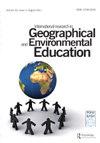欧洲移民潮中年轻人的世界意识——以捷克、芬兰、德国和荷兰为例
IF 3.1
Q2 EDUCATION & EDUCATIONAL RESEARCH
International Research in Geographical and Environmental Education
Pub Date : 2021-09-01
DOI:10.1080/10382046.2021.1969791
引用次数: 0
摘要
摘要在2015年欧洲移民潮突然上升期间,约有240万难民抵达欧洲,在欧盟国家收到了120万份庇护申请。我们有兴趣了解这些快速的变化和媒体上表现出的两极分化的态度是否影响了年轻人对不同文化背景的人的态度。因此,这项研究考察了四个欧洲国家的年轻人对全球的理解:捷克、芬兰、德国和荷兰。其目的是确定年轻人的世界意识水平,并将结果与早期的一项研究(2010年进行)进行比较。这项研究的对象是这些国家的一群高中生。2017年,共有962名学生参与了这项研究。尽管观察到的国家的情况各不相同,但研究结果显示,到2010年,所有国家的世界意识都处于稳定状态,或者说略有积极变化。研究结果强调,在地理课上,尤其是在教授和学习当前社会问题、不平等、排斥和团结时,需要对学生对其他人和文化的意见和态度保持敏感。本文章由计算机程序翻译,如有差异,请以英文原文为准。
World-mindedness of young people during the rise in migration in Europe: a case study of Czechia, Finland, Germany and The Netherlands
Abstract During the 2015 sudden rise in migration movements in Europe, approximately 2.4 million refugees arrived in Europe and 1.2 million asylum applications were received in the European Union countries. We were interested in finding out whether these rapid changes and the polarised attitudes represented in the media affected young people’s attitudes towards people with different cultural backgrounds. This study, therefore, examined young people’s global understanding in four European countries: Czechia, Finland, Germany and the Netherlands. The aim was to identify the level of world-mindedness of young people and compare the results with an earlier study (conducted in 2010) with the same research design. The research was targeted at a group of upper-secondary students in these countries. In total, 962 students participated in the study in 2017. Although the context in the observed countries varied, the findings revealed a stable state, or rather a slightly positive change of world-mindedness, to 2010 in all the countries. The results stress the need to remain sensitive to students’ opinions and attitudes towards other people and cultures in geography lessons in general and especially when teaching and learning about current societal issues, inequality, exclusion and solidarity.
求助全文
通过发布文献求助,成功后即可免费获取论文全文。
去求助
来源期刊

International Research in Geographical and Environmental Education
EDUCATION & EDUCATIONAL RESEARCH-
CiteScore
5.20
自引率
33.30%
发文量
11
期刊介绍:
International Research in Geographical & Environmental Education publishes quality research studies within the context of geographical and environmental education. The journal endeavours to promote international interest and dissemination of research in the field, provides a forum for critique, and demonstrates the relevance of research studies to good professional practice.
 求助内容:
求助内容: 应助结果提醒方式:
应助结果提醒方式:


